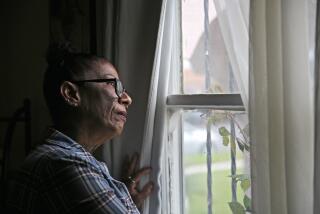U.S. Supports Breast-Feeding, but Provides Free Formula : Families: For needy mothers, the giveaways through the WIC program are seen as a kind of government endorsement of bottle-feeding.
- Share via
NEW YORK — In crowded city clinics where poor mothers come to fill their babies’ bottles, Nkenge Mollineau cuts a familiar figure: young, black and heavy with child, waiting her turn for food vouchers and counseling.
There are many like her across the nation, but few make the choice Mollineau already has made for her unborn baby.
She will breast-feed her child, she says, as long and as well as she can. There will be no formula, no bottles for her newborn baby.
That decision sets her apart from much of the packed waiting room at clinics that administer WIC, the government’s Special Supplemental Food Program for Women, Infants and Children, which gives away formula to millions of mothers.
No group of women is less likely to nurse their babies, and public health officials say no group of infants and mothers would benefit more.
“I’m 19, and all the girls my age bottle-feed,” Mollineau said. “None of them breast-feed. They haven’t even considered it. It’s just formula, and that’s it.”
The consistently low breast-feeding rates among WIC mothers, and its steady decline among all U.S. women, has set off alarm bells in government, medical and public health circles, where breast-feeding is recognized as the best way to nourish and nurture babies.
As 1990 came and went, the U.S. surgeon general’s breast-feeding objective for that year--75% at hospital discharge--was further away than ever. Only about half of all women nursed their newborn infants, compared to 62% in 1982, a drop of about 10 percentage points in less than eight years, according to a survey conducted by Ross Laboratories, an infant formula manufacturer.
For many women, lack of confidence, embarrassment and concern about loss of freedom are hurdles they have no resources to clear. Lack of support--at home, at the hospital, at the doctor’s office and at work--takes a heavy toll.
Media messages and breast-feeding materials themselves often reinforce those doubts and promote the myth that there is little or no difference between formula and breast milk.
But for mothers living in poverty, free distribution of infant formula through the highly praised WIC program, seen as a kind of government endorsement of bottle-feeding, may be the biggest disincentive of all.
“It’s a shame, because in a way, the people who could benefit the most are doing it the least,” said Betty Crase of La Leche League International, a nonprofit group that promotes breast-feeding. “And the government--I’d like to say inadvertently--is supporting that.”
In the last 20 years, the U.S. government has become the world’s single largest infant formula customer, giving away about $750 million worth to millions of low-income mothers last year alone. The free distribution of formula is at direct odds with the government’s--and WIC’s--stated goals of promoting breast-feeding, a fact the government readily acknowledges and is slowly moving to change.
A recent reauthorization of WIC set aside $8 million for breast-feeding education, support and promotion, still a tiny drop in the $2.35-billion WIC bucket. At the U.S. Department of Agriculture, which administers WIC, Assistant Secretary Catherine Bertini has organized a breast-feeding consortium of pediatricians, obstetricians, nurses, hospitals and public health officials to address the problem.
USDA also is trying to promote a national breast-feeding campaign aimed at all American women, said Ron Vogel, who heads WIC for the agriculture department.
“You have to be able as a society to take a bold stand and say, ‘Breast-feeding is what’s best for babies,’ ” Vogel said.
In the 1930s, 77% of American babies were breast-fed. That percentage dropped every subsequent decade and hit a low of 22% in 1972, the year WIC was authorized by Congress. In the next 10 years, breast-feeding rates climbed 40 percentage points, a result of increased awareness of its benefits.
Bolstered by their mothers’ immunities, breast-fed babies rarely suffer from diarrhea or intestinal upsets and have far fewer ear and upper respiratory infections. They are less likely to die of sudden infant death syndrome, develop allergic reactions or contract chronic diseases such as diabetes, Crohn’s disease and leukemia.
Recent research also shows lower rates of breast cancer among women who nurse their children for more than a year, and a reduced risk of osteoporosis among women who have breast-fed.
The intangible emotional benefits that come with breast-feeding, the special bond it can create, may be harder to measure but just as important, government officials say.
But despite WIC’s mandate to encourage breast-feeding, only 34% of WIC mothers nursed their babies in the hospital, compared to 63% of non-WIC mothers, a 1989 Ross survey showed.
Only 9% of WIC mothers still were nursing five months later, compared to 26% of non-WIC mothers. The American Academy of Pediatrics recommends that babies be exclusively breast-fed for the first four to six months of life.
Non-WIC mothers of all races were far more likely to breast-feed than WIC mothers. The greatest disparity was among black women, who were twice as likely to nurse if they were not involved with WIC.
“There are people who go so far as to say WIC should not provide infant formula because it’s a disincentive to breast-feeding,” said Dennis Bach, chairman of the National Assn. of WIC Directors. “The problem is, while breast-feeding is far and away the best form of nutrition for infants, and you can do everything in your power to educate women that’s the way it is, ultimately, it’s going to be her choice.”
Turn off the formula spigot, WIC officials worry, and some women still won’t breast-feed--they’ll use cow’s milk, which can damage infants’ immature digestive systems. Anthropologist-nutritionist Carol Bryant of the University of South Florida asked low-income women whether they would breast-feed if they didn’t receive WIC’s free formula; some said no, emphatically.
“There are many of us in this country examining the question, ‘Should the WIC program not give out formula for the first month or two, as a way to avoid sending a message that formula-feeding’s best, and also to motivate women?’ ” Bryant said.
Perhaps, she said, but first “we need to be sure we have a support system out there for women (who) want to breast-feed. I think it’s unfair to deny a choice to poor women of formula-feeding, push them strongly to breast-feeding, and then not make it easy for them to do that.”
Critics of WIC’s formula giveaway believe WIC mothers rarely have had enough information about breast-feeding to make an educated choice and that WIC professionals rarely have had enough time or money to educate them.
“No woman should be forced to breast-feed, but women ought to be able to make an informed decision,” said Ruth Lawrence, professor of pediatrics, obstetrics and gynecology at the University of Rochester Medical Center. “And they can’t do that if nobody talks to them.”
Today, older, college-educated, affluent white women are the ones most likely to choose to nurse their babies, and to do so the longest. But even the best-intentioned mother, regardless of social status, can find herself derailed by lack of support, which often starts with myths perpetuated by family and friends and bad advice from doctors and hospital staff.
“What we have learned is that you have to help women understand that just about anybody can breast-feed,” said Minda Lazarov, Tennessee’s director of breast-feeding promotion programs. “If you don’t happen to eat exactly right, and you don’t rest, and do all that, you can still breast-feed.”
For three years, Tennessee has used a peer counselor program to increase pitifully low breast-feeding rates in its poorest rural counties. WIC moms who have breast-fed were trained to help and support other mothers, a deceptively simple concept that has had a tremendous impact. In several counties, breast-feeding rates at six weeks jumped from less than 4% to more than 20%, and babies were being nursed longer.
Similar projects are popping up in WIC programs across the nation, many modeled on anthropologist Bryant’s “Best Start” breast-feeding promotion campaign, and all include education of doctors, nurses and hospital staff.
“Doctors don’t see their patients soon enough when they’re breast-feeding in order to support them,” said Dr. Marji Gold, a family practitioner at Montefiore Family Health Center in the Bronx, who nursed her own four children. “They probably don’t know enough, so they can’t answer questions, so when they get stuck and can’t answer, they don’t make an adequate referral. They just say, ‘You better give the baby formula instead.’ ”
The promotion programs target obstetricians, who can play a key role by discussing breast-feeding during prenatal care, a time when studies show most women decide how to feed their babies.
They also work to change hospital policies that undermine breast-feeding, such as using breast-feeding information supplied by formula manufacturers and giving away “discharge packs” of formula to women regardless of whether they are nursing, a practice known to shorten breast-feeding duration.
But the most powerful force for change in WIC are WIC mothers themselves. Through peer-counseling programs, they share the intimate knowledge of their joy in breast-feeding.
“The special moments you have, when that child looks up at you and smiles as he’s falling asleep, you can’t get that any other way,” said Barbara Skold, who has nursed three children and now counsels other WIC mothers at the Morrisania WIC in New York.
One of her fellow counselors, abused as a child by drug-addicted parents, now has two children of her own. Nursing has created a bond with them she never knew herself.
“There are times when she’ll want to yell at those children, or hit those children, but I think because of that breast-feeding, and what she’s learned about parenting because of that breast-feeding . . . she’s raising those children very, very differently than she was raised,” said Djamillah Samad, Morrisania’s breast-feeding coordinator.
More to Read
Sign up for Essential California
The most important California stories and recommendations in your inbox every morning.
You may occasionally receive promotional content from the Los Angeles Times.










